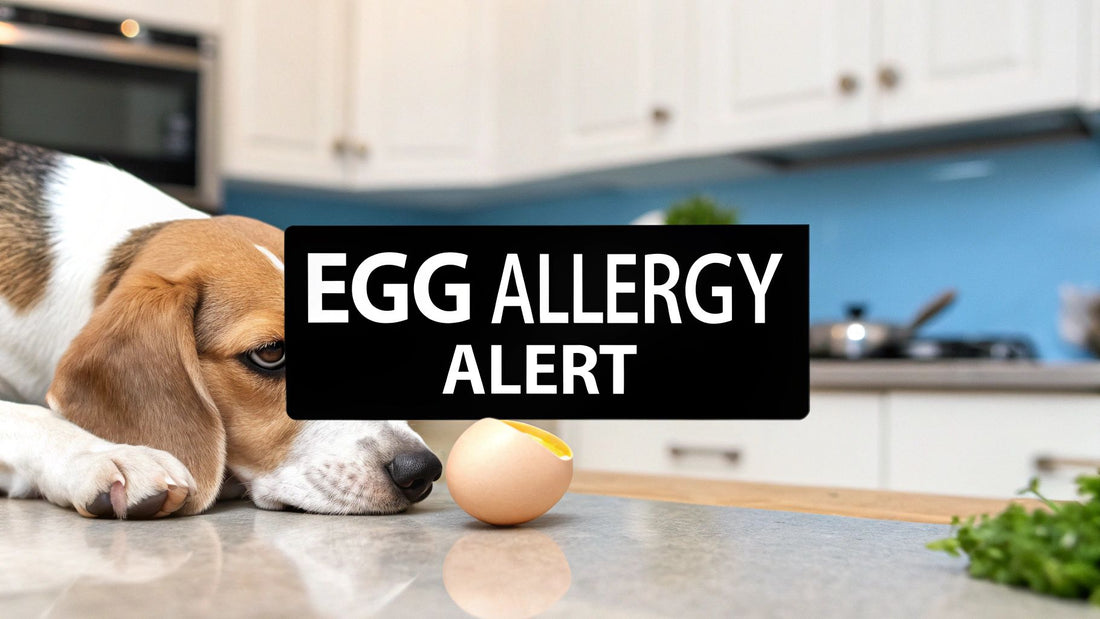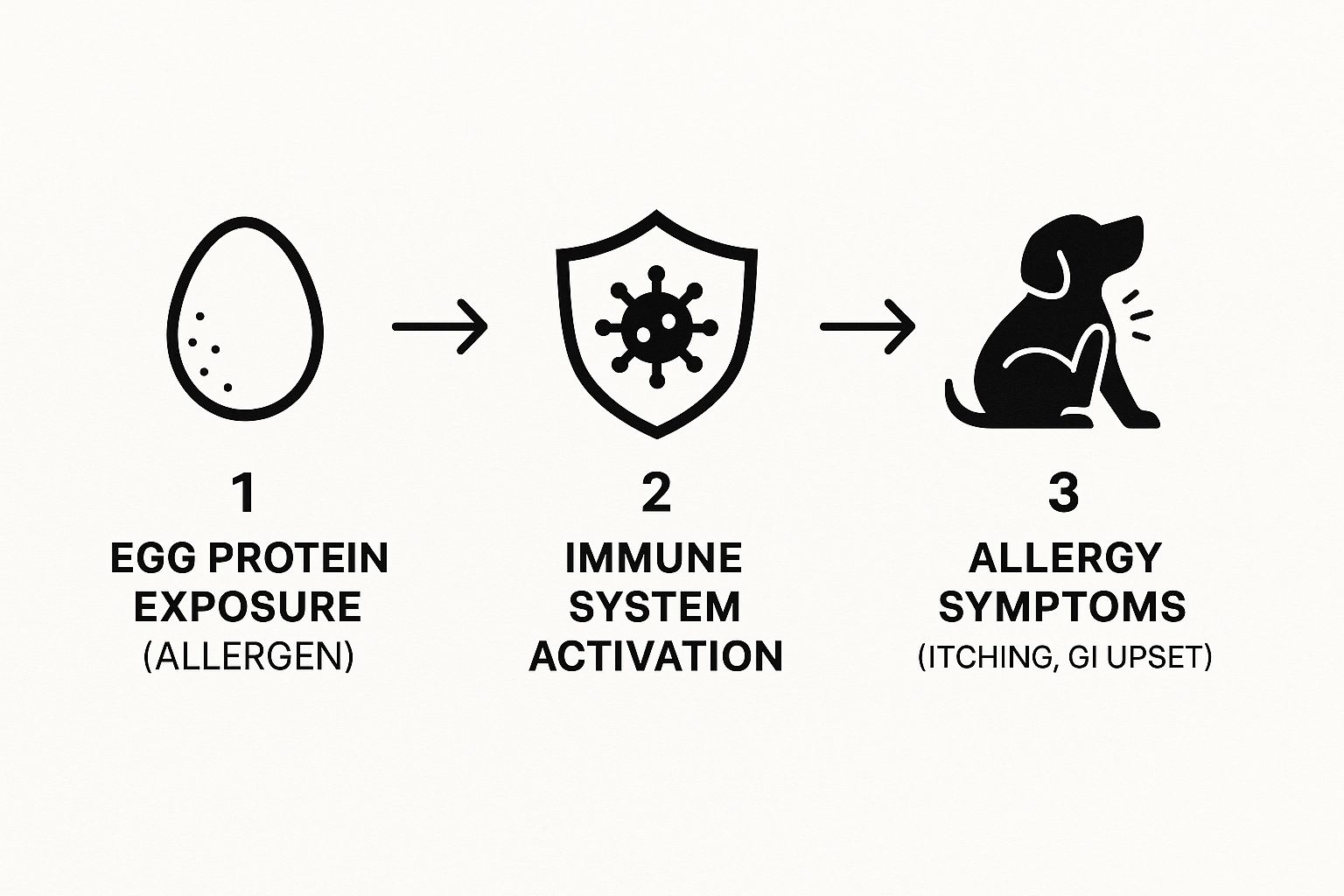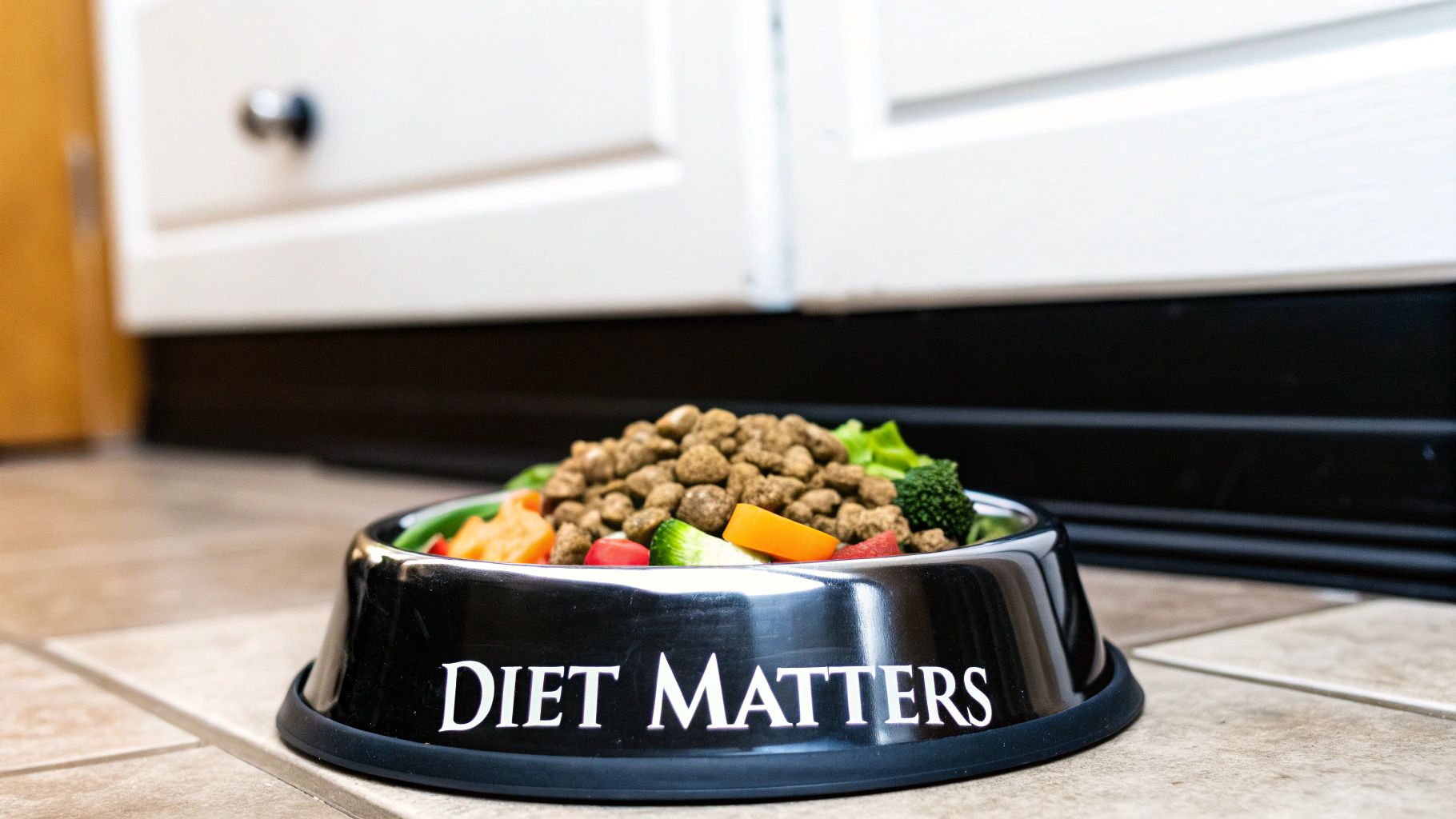
Can Dogs Be Allergic to Eggs? A Vet-Approved Guide
Let's cut right to the chase: yes, dogs can definitely be allergic to eggs. While they’re a fantastic source of protein for most dogs, eggs can trigger a serious immune system flare-up in others. If you've been eyeing that breakfast staple and wondering if it's the source of your dog's mysterious health issues, you're on the right track.
The "Mistaken Identity" Behind Egg Allergies
So, we know dogs can be allergic to eggs, but what does that actually mean? It’s not that the egg itself is "bad." The problem is a case of mistaken identity happening inside your dog’s body.
Imagine your dog's immune system is a sophisticated security guard, trained to spot and neutralize real threats like viruses and bacteria. In a dog with an egg allergy, this system makes a mistake. It misidentifies the harmless proteins in an egg as dangerous invaders and sounds the alarm.
When that false alarm goes off, the immune system launches a full-blown attack. This internal battle is what causes the external symptoms we see—the relentless scratching, irritated skin, or stomach problems that leave our dogs feeling miserable.
How Common Are Egg Allergies in Dogs?
While an egg allergy can be a real headache to deal with, it’s not the most common food allergy out there. Vets find that proteins like beef, dairy, and chicken are much more frequent offenders. That said, eggs are still a significant allergen to keep on your radar.
To give you a clearer picture of where eggs stand, here’s how they stack up against other common food allergens in dogs.
How Egg Allergies Compare to Other Food Allergens
| Food Allergen | Prevalence in Allergic Dogs |
|---|---|
| Beef | 34% |
| Dairy Products | 17% |
| Chicken | 15% |
| Wheat | 13% |
| Soy | 6% |
| Lamb | 5% |
| Egg | 4% |
| Corn | 4% |
| Pork | 2% |
| Fish | 2% |
| Rice | 2% |
Data sourced from a comprehensive review of studies on canine food allergens.
As the data shows, eggs were identified as the culprit in about 4% of diagnosed cases. While that might seem low compared to beef's 34%, it's still a real possibility your vet will investigate. Knowing this helps manage expectations and guides the diagnostic process, which is the first step toward getting your furry friend some much-needed relief.
2. What's Happening Inside My Dog's Body?
Ever wonder what’s actually going on when your dog has an allergic reaction to eggs? Think of your dog's immune system as a highly trained bodyguard. Its job is to spot and neutralize real threats. But sometimes, it gets things wrong.
With an egg allergy, this bodyguard mistakes perfectly harmless proteins in the egg for dangerous intruders. This is a classic case of mistaken identity, and it sets off a whole chain reaction inside your dog.
It all starts with the first time your dog eats an egg. This initial exposure is called sensitization. The immune system checks out the egg proteins and, in an allergic dog, incorrectly flags them as a problem. It then creates custom-made antibodies called Immunoglobulin E (IgE) specifically to fight this "threat." These IgE antibodies latch onto mast cells—special immune cells hanging out in the skin, gut, and respiratory tract—and lie in wait.
The Allergic Meltdown
The real fireworks begin the next time your dog eats something with egg in it. The egg proteins link up with those waiting IgE antibodies, which is the signal for the mast cells to panic.
These mast cells then burst open, releasing a flood of powerful chemicals, most famously histamine. It's this sudden rush of histamine that’s the real culprit behind all those miserable allergy symptoms, from itchy skin to an upset stomach.

This process shows how a simple, nutritious food can suddenly become public enemy number one for your dog’s body. The egg isn't the villain; it’s the immune system's wildly over-the-top response.
This overreaction is why a food meant to be nourishing can cause so much discomfort. The immune system's goal is protection, but in an allergy, its response is dialed up way too high, causing more harm than good.
Finding the Culprit: Hidden Eggs in Dog Food
Since this entire reaction is kicked off by egg proteins, the only way to manage it is through strict avoidance. This turns you into a bit of a detective, because egg isn't always listed plainly as "egg."
You have to get good at scanning ingredient lists. Eggs can hide under different names, and being able to spot them is a crucial skill for any pet parent managing food allergies. If you want to become a pro, we've got a helpful resource on how to read dog food labels that breaks it all down.
2. Spotting the Telltale Signs of an Egg Allergy

It can be tough to figure out why your dog isn't feeling their best. Is it just an off day, or is something they ate causing the trouble? Learning to recognize the signs of an egg allergy is the first, most important step you can take. These symptoms can be sneaky and often look like other common health problems, but they usually show up in a few key ways.
The most common red flag for almost any food allergy, eggs included, is irritated skin. This isn't just a quick scratch behind the ears. We're talking about persistent, chronic issues that can make your dog absolutely miserable. When the body has an allergic reaction, it floods the system with histamines, leading to inflammation and that maddening, intense itch.
Skin, Coat, and Ear Problems
Since the skin is your dog's largest organ, it’s often the first place to show signs of an internal battle. Pay close attention to any new or obsessive behaviors. Did that non-stop paw licking start right after you began adding a scrambled egg to their breakfast? That's a huge clue.
Keep an eye out for these specific signs:
- Relentless Itching: Is your dog constantly scratching, biting, or licking their paws, belly, or groin?
- Hot Spots: These are angry, red, and sometimes weeping patches of skin that can pop up seemingly overnight from all the licking and scratching.
- Recurrent Ear Infections: Are you always at the vet for gunky, smelly, or red ears? An underlying food allergy is a very common trigger, since the ear canal is lined with sensitive skin.
- Hair Loss: All that scratching can lead to bald patches, especially around the flanks, tail base, and belly.
- Hives or Rashes: Some dogs might break out in raised bumps or develop a rash across their body.
Pro Tip: Timing is everything. Being able to tell your veterinarian that the itching started a week after you introduced eggs gives them a powerful piece of the diagnostic puzzle.
Digestive Upsets
While skin issues are front and center, an egg allergy can also throw your dog’s digestive system into chaos. The allergic response can inflame the gastrointestinal tract, leading to some pretty obvious discomfort.
These signs often get mistaken for a simple stomach bug. But when they keep coming back or become a chronic issue, it’s time to seriously consider a food allergy as the root cause.
Watch for these digestive warning signs:
- Vomiting or Diarrhea: A single episode isn't a huge worry, but if it's happening consistently, that’s a major red flag.
- Excessive Gas: Sure, all dogs have gas. But a sudden increase, especially if it's unusually foul-smelling, points to digestive distress.
- Straining During Bowel Movements: Gut inflammation can make going to the bathroom difficult or uncomfortable for your dog.
To help you keep track, here’s a quick reference table for the most common symptoms you might see.
Symptom Checker for Potential Egg Allergies
| Symptom Category | Specific Signs to Watch For |
|---|---|
| Skin & Coat | Constant scratching or licking (especially paws, belly), hot spots, rashes, hives, hair loss. |
| Ears | Redness, smelly discharge, head shaking, scratching at ears, chronic ear infections. |
| Digestive System | Chronic diarrhea or loose stools, vomiting, excessive and foul-smelling gas, straining to defecate. |
If you're noticing any combination of these skin, ear, and gut symptoms, start taking notes. This detailed information will be invaluable when you talk to your vet to get a proper diagnosis and finally get your dog some relief.
How Your Vet Will Figure Out an Egg Allergy
If you've noticed your dog getting itchy or sick after eating and suspect eggs are the culprit, your intuition might be right. But when it comes to allergies, guessing games can lead to frustration and unnecessary dietary restrictions. The only way to know for sure is to partner with your veterinarian for a proper diagnosis.
You've probably heard about allergy tests for dogs, like blood tests or even skin patch tests. While they sound like a quick fix, these tests have a major downside: they're notoriously unreliable for food allergies. They often flag ingredients that aren't actually a problem, leading well-meaning owners down a rabbit hole of eliminating foods for no reason. For this reason, most vets don't rely on them to pinpoint a food-related issue.
The Gold Standard: The Elimination Diet
So, what's the right way to do it? Vets have one tried-and-true method that stands above the rest: the elimination diet. It’s the most accurate diagnostic tool we have for food allergies, and the concept is simple. You temporarily remove all potential food triggers to see if the symptoms go away, then add them back one by one to see what causes a reaction.
Think of it as a science experiment for your dog's diet. It’s a carefully controlled process that must be done under your vet's guidance. They'll make sure your dog gets all the necessary nutrients while helping you interpret the results accurately.
The diet itself is a strict commitment, typically lasting for 8 to 12 weeks. During this period, your dog can eat only the special food prescribed by your vet. That means no treats, no table scraps, no flavored toothpaste, and not even flavored medications unless your vet gives the okay. The food will usually be one of two kinds:
- A Novel Protein Diet: This diet features a protein your dog has likely never eaten before. Think venison, duck, or even kangaroo. The idea is that the immune system can't react to something it's never encountered.
- A Hydrolyzed Protein Diet: This is a bit more high-tech. The proteins in this food are broken down into microscopic pieces, so small that your dog’s immune system can’t recognize them as allergens and launch an attack.
If your dog’s itching, ear infections, or digestive issues clear up by the end of the trial, that's a huge clue. It strongly points to a food allergy as the underlying cause.
The Final Step: The Food Challenge
Once your dog is feeling better and their symptoms are gone, it's time for the final piece of the puzzle: the food challenge. This is the moment of truth where you confirm the specific trigger.
Following your vet’s instructions, you’ll reintroduce a single ingredient—in this case, plain, cooked egg—into their diet. Then, you watch and wait.
If the old allergy symptoms flare up again within a few days to two weeks of adding egg back into the diet, you've found your culprit. This reaction is the definitive confirmation of an egg allergy.
Sticking to an elimination diet isn't easy; it demands real dedication. You'll need to become a master label-reader and a gatekeeper for everything your dog eats. But the payoff is immense. It provides the clear, reliable answers you need to manage your dog's diet effectively and give them a much more comfortable, itch-free life.
Living Happily with an Egg-Allergic Dog

Getting that confirmation from the vet—"your dog has an egg allergy"—can feel like a big, scary diagnosis. But it doesn't mean a lesser life for your best friend. It just means you have a new game plan. The truth is, managing an egg allergy is completely doable, and it all boils down to one golden rule: strict avoidance. This single principle is the cornerstone of keeping your dog happy and symptom-free for the long haul.
From now on, think of yourself as your dog's personal dietary detective. Your main job is to make absolutely sure that no egg ingredients, not even a trace, end up in their food bowl. This means getting really good at reading pet food labels, because egg isn't always spelled out in black and white. It has a knack for hiding under some pretty sneaky aliases.
Spotting Hidden Egg on Food Labels
To truly protect your dog, you'll need to learn the lingo. Manufacturers use a variety of terms for egg and its components, and knowing what to look for is your best defense against an accidental reaction.
Keep your eyes peeled for these common culprits on an ingredient panel:
- Egg Product: This is a catch-all term that could mean anything from whole eggs to just the whites or yolks.
- Dried Egg: Just dehydrated egg, but it's often used to bind kibble or boost protein content.
- Albumin: This is the specific protein that makes up egg whites.
- Globulin: Another type of protein, this one found in the yolk.
- Lysozyme: An enzyme that comes from egg whites.
Managing an allergy is all about prevention, not just reaction. When you diligently check every ingredient list—on food, treats, and even supplements—you create a safe bubble where your dog can live comfortably without the constant irritation of allergic reactions.
Handling Accidental Exposure and Flare-Ups
No matter how careful you are, accidents can happen. Maybe a well-meaning friend slips your pup a table scrap, or a new brand of treats contains an unlisted egg derivative. If your dog gets exposed and symptoms start to show, try not to panic.
Your first step should always be to call your veterinarian. They’ll give you the best advice based on how severe your dog's reaction is. For a mild case of itching or a small rash, they might just recommend some supportive care to manage the flare-up and keep your dog comfortable. For dogs whose allergies mainly show up on their skin, nutrition is a powerful tool; you can learn more about finding the best dog food for skin allergies to support their overall health.
To help soothe the immediate symptoms, your vet might suggest a few things:
- Antihistamines: Something like Benadryl can sometimes take the edge off the itchiness, but you must check with your vet for the correct dosage for your dog's weight.
- Medicated Shampoos: A calming bath with a special shampoo from your vet can provide instant relief to inflamed, angry skin.
- Topical Creams: If your dog has developed a localized hot spot, your vet may prescribe a cream to bring down the inflammation and stop an infection from setting in.
Armed with a solid avoidance plan and a clear strategy for handling the occasional flare-up, you have everything you need to give your egg-allergic dog a wonderful, comfortable, and happy life.
7. Safe and Delicious Egg Alternatives Your Dog Will Love

When you discover your dog has an egg allergy, it’s easy to feel like their diet just got a lot more complicated. But I like to see it as an opportunity—a chance to introduce them to a whole new world of delicious, healthy foods they might love even more.
The trick is to swap out eggs with other high-quality, single-ingredient proteins. You'll find plenty of fantastic options that can make your dog's meals even more exciting and nutritious, keeping that tail wagging just as much as before.
Think of this dietary shift not as a restriction, but as a positive move toward better health. By focusing on what your dog can have, you can build a diverse, exciting, and completely safe meal plan.
Excellent Protein Swaps for Dogs
So, what can you use instead of eggs? The goal is to find lean, easily digestible proteins that are packed with the nutrients your dog needs to thrive.
Here are a few great options to run by your vet:
- Cooked Salmon or Whitefish: These aren't just tasty; they're loaded with omega-3 fatty acids, which do wonders for a dog's skin and coat.
- Lean Turkey or Chicken: You can't go wrong with this classic. Just be sure it's plain, cooked, and unseasoned to keep it simple and safe.
- Lentils or Quinoa: If you're open to plant-based proteins, these can be a great addition in moderation. Always get your vet's okay first and make sure they're prepared properly for dogs.
Tasty and Safe Meal Toppers
Just because eggs are off the menu doesn't mean mealtime has to be boring. You can still jazz up their regular kibble with some simple, safe toppers that add a burst of flavor and a nutritional punch.
Try adding a spoonful of one of these to their bowl:
- Plain Pumpkin Purée: This is a fantastic source of fiber and works wonders for their digestion.
- Plain, Unsweetened Yogurt: If dairy isn't an issue, yogurt offers beneficial probiotics for gut health.
- Single-Ingredient Treats: Many companies make treats specifically for sensitive dogs, so look for options that are free of eggs and other common allergens.
Exploring these alternatives ensures your dog’s diet stays balanced, enjoyable, and allergy-free. For even more ideas, check out our guide to the healthiest treats for dogs to find the perfect snacks for your sensitive pup.
Your Top Questions About Dog Egg Allergies, Answered
When you're trying to figure out your dog's food sensitivities, a lot of questions can pop up. It's totally normal to feel a bit overwhelmed. Let's walk through some of the most common concerns I hear from pet parents dealing with potential egg allergies.
Is My Dog Allergic to the Egg White or the Yolk?
This is a great question. While a dog can react to proteins in either part of the egg, it’s the egg white that tends to be the bigger culprit. The proteins in the white, like albumin, are more often the source of the allergic reaction.
Realistically, though, it's almost impossible to separate the two perfectly. Since both the white and the yolk contain potential allergens, the only truly safe approach is to remove the entire egg from their diet. It's just not worth the risk.
Can My Dog Suddenly Develop an Egg Allergy?
Yes, and this one surprises a lot of people! It's a common myth that allergies only show up when a dog is young. Your dog could have enjoyed eggs for years without a single problem and then, seemingly out of nowhere, start showing signs of an allergy.
Think of it like a bucket filling up over time. Each exposure to the egg protein adds a little more to the bucket until it finally overflows, triggering an immune response. So, a new reaction to an old favorite food is definitely something that can happen.
Allergy vs. Intolerance: What's the Difference?
An allergy is your dog's immune system overreacting to a protein, causing things like intense itching, hives, and inflammation. An intolerance is purely a digestive problem—it doesn't involve the immune system and usually just leads to gas or an upset stomach. An allergy is a much more serious health concern.
If My Dog Is Allergic to Eggs, Are They Allergic to Chicken Too?
Not necessarily, but it’s smart to be cautious. Even though eggs and chicken meat come from the same bird, the proteins that cause the allergic reactions are different. The protein in an egg isn't the same as the protein in chicken muscle tissue.
Many dogs with a confirmed egg allergy can eat chicken just fine. However, if your dog is one of the unlucky ones with multiple food sensitivities, they could be allergic to both. This is where a strict elimination diet becomes your best tool for getting a clear answer.
At Joyfull, we get it. We believe that a healthy, happy life isn't just for people. That's why we create transparent, high-quality foods and treats you can trust. You can explore our single-ingredient options and build a safe, delicious diet for your best friend by visiting Joyfullpet.com.

